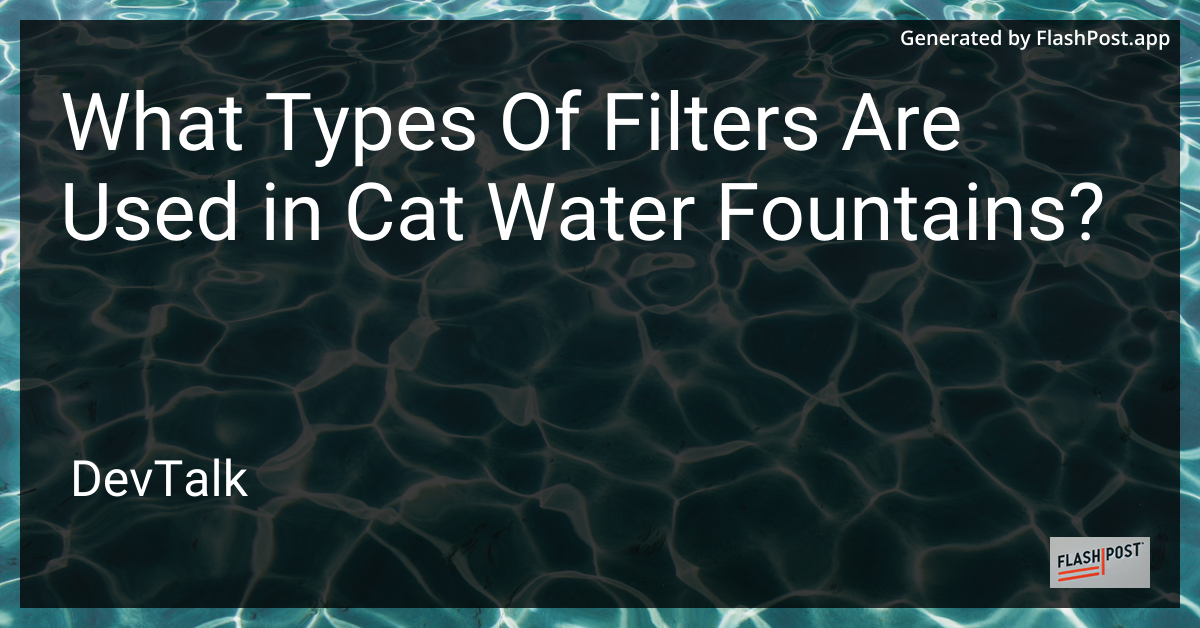What Types Of Filters Are Used in Cat Water Fountains?

What Types of Filters are Used in Cat Water Fountains?
When it comes to ensuring the health and well-being of your furry companions, the quality of their drinking water should not be overlooked.
Cat water fountains have become increasingly popular as they provide a continuous flow of fresh water, encouraging cats to drink more. A key component of these fountains is the filter, which is crucial in maintaining water purity. In this article, we'll explore the different types of filters used in cat water fountains and their benefits.
Types of Filters in Cat Water Fountains
1. Activated Carbon Filters
Activated carbon filters are among the most common types of filters used in cat water fountains. These are typically made from coconut shells or coal and are highly effective in removing impurities. Activated carbon filters work by adsorbing contaminants like chlorine, odors, and tastes that may discourage cats from drinking. Regular replacement of these filters is necessary to maintain their effectiveness.
2. Foam Filters
Foam filters serve as mechanical barriers, capturing larger debris such as hair, dirt, and food particles. They are often used in conjunction with activated carbon filters for comprehensive filtration. Foam filters are reusable but require regular cleaning to prevent clogs and ensure proper water flow.
3. Ceramic Filters
Ceramic filters are known for their durability and long-lasting filtration capabilities. They use microporous ceramic material to trap fine particles and bacteria, providing a high level of filtration. Although they tend to be more expensive than other options, their longevity and efficacy can offset the initial cost over time.
4. Ion Exchange Filters
Ion exchange filters are designed to soften water by removing calcium and magnesium ions, which contribute to water hardness. This type of filtration is beneficial for cats with sensitive digestive systems or urinary tract issues. While effective, these filters may need replacement more frequently depending on the hardness of your water source.
5. Ultraviolet (UV) Filters
UV filters utilize ultraviolet light to sterilize water by killing bacteria and viruses. While not commonly found in all cat fountains, UV filtration is an excellent option for pet owners particularly concerned about microbial contamination. It is usually used in conjunction with other filter types to provide comprehensive water purification.
Conclusion
Choosing the right filter for your cat water fountain depends on several factors, including water quality, budget, and your cat’s specific needs. Ensuring that the water is both appealing and healthy for your cat will promote hydration and support overall well-being. Remember to follow the manufacturer’s instructions for filter maintenance and replacement to maximize the fountain's benefit.
For insights into future developments that may influence product innovations, you may find the future of employment verification enlightening. Additionally, exploring the tax implications of mining crypto can provide an understanding of how financial considerations can impact business. Lastly, if you are a tech enthusiast wanting to learn more about effective coding practices, especially regarding powershell HTML string modification, there are resources to explore that subject as well.
By staying informed and attentive to details, you can not only enhance your cat's health but also keep pace with evolving trends and best practices across various fields.